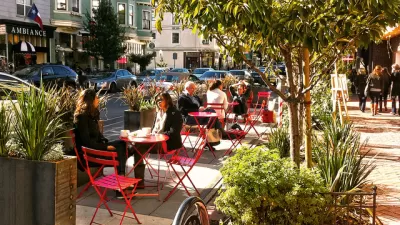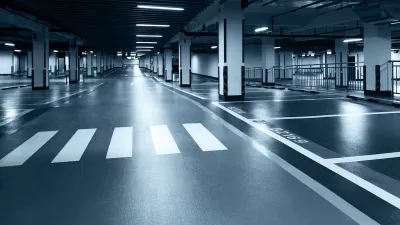Like many cities across the country revisiting their outdated zoning codes, Washington D.C. has made parking requirement reform a centerpiece of their efforts. These efforts have attracted the ire of residents and AAA who fear parking armageddon.
"After six years of work, the first major rewrite of Washington, D.C.'s zoning code since 1958 is inching closer to approval. But it's facing fierce opposition from some residents who worry it will shrink parking," reports Martin Di Caro.
"Under the new proposal, developers would no longer be required to construct a minimum number of parking spaces in new apartment housing, office, and retail space in downtown D.C., near Metro rail stations, and in busy bus corridors," he explains. At a D.C. Council hearing held this week, "Office of Planning Director Harriet Tregoning told council members that the current rules are outdated, prescribing a one-size-fits-all approach that does not reflect driving and parking demand in individual neighborhoods."
"Opponents testified that the elimination of parking minimums would force drivers to circle their neighborhoods looking for spaces. Despite efforts to reduce car dependency, the number of vehicles in the District is increasing, they said."
FULL STORY: D.C. Defends Proposal to Change Mandatory Parking Minimums

Planetizen Federal Action Tracker
A weekly monitor of how Trump’s orders and actions are impacting planners and planning in America.

Map: Where Senate Republicans Want to Sell Your Public Lands
For public land advocates, the Senate Republicans’ proposal to sell millions of acres of public land in the West is “the biggest fight of their careers.”

Restaurant Patios Were a Pandemic Win — Why Were They so Hard to Keep?
Social distancing requirements and changes in travel patterns prompted cities to pilot new uses for street and sidewalk space. Then it got complicated.

Platform Pilsner: Vancouver Transit Agency Releases... a Beer?
TransLink will receive a portion of every sale of the four-pack.

Toronto Weighs Cheaper Transit, Parking Hikes for Major Events
Special event rates would take effect during large festivals, sports games and concerts to ‘discourage driving, manage congestion and free up space for transit.”

Berlin to Consider Car-Free Zone Larger Than Manhattan
The area bound by the 22-mile Ringbahn would still allow 12 uses of a private automobile per year per person, and several other exemptions.
Urban Design for Planners 1: Software Tools
This six-course series explores essential urban design concepts using open source software and equips planners with the tools they need to participate fully in the urban design process.
Planning for Universal Design
Learn the tools for implementing Universal Design in planning regulations.
Heyer Gruel & Associates PA
JM Goldson LLC
Custer County Colorado
City of Camden Redevelopment Agency
City of Astoria
Transportation Research & Education Center (TREC) at Portland State University
Camden Redevelopment Agency
City of Claremont
Municipality of Princeton (NJ)





























